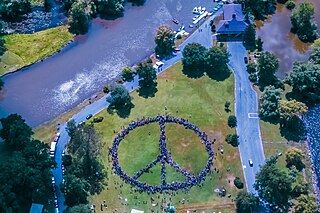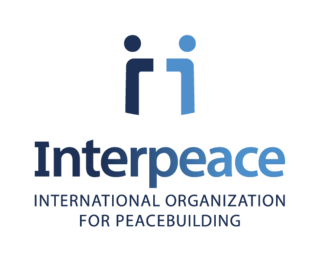
The Directorate-General for European Civil Protection and Humanitarian Aid Operations, formerly known as the European Community Humanitarian Aid Office, is the European Commission's department for overseas humanitarian aid and for civil protection. It aims to save and preserve life, prevent and alleviate human suffering and safeguard the integrity and dignity of populations affected by natural disasters and man-made crises.
Peaceworkers UK (PWUK) is part of the Peacebuilding Issues Programme of International Alert. Previously an independent non-governmental organisation, PWUK became part of International Alert in 2006. PWUK focuses on raising standards in the field of conflict prevention, crisis management and peacebuilding through an integrated programme of research, training, assessment and recruitment. It is led by a Director who has a PhD in Peace Studies and over 20 years management experience in the field.
Kumar Rupesinghe is an academic and activist involved in social issues, particularly human rights, development issues, processes of globalisation, conflict prevention/resolution, and conflict transformation in the light of peacekeeping and peacebuilding for a harmonious coexistence among all peoples in the world.

Peacebuilding is an activity that aims to resolve injustice in nonviolent ways and to transform the cultural & structural conditions that generate deadly or destructive conflict. It revolves around developing constructive personal, group, and political relationships across ethnic, religious, class, national, and racial boundaries. This process includes violence prevention; conflict management, resolution, or transformation; and post-conflict reconciliation or trauma healing, i.e., before, during, and after any given case of violence.
The United Network of Young Peacebuilders is a global network of young people and youth organisations active in the field of peacebuilding and conflict transformation. UNOY Peacebuilders was founded in 1989 and is working with youth mostly in violent conflict and post war regions. The core activities of UNOY Peacebuilders are capacity building as well as advocacy and campaigning.

The Quaker Council for European Affairs (QCEA) is an international not-for-profit organisation which seeks to promote the values and political concerns of the Religious Society of Friends (Quakers) at the European level. It undertakes research and advocacy in the fields of peacebuilding and human rights policy, notably in relation to the European Union and the Council of Europe. Founded in 1979 by Quakers who worked in the European institutions, it is based in Brussels, Belgium and is registered under Belgian law.

The Global Partnership for the Prevention of Armed Conflict (GPPAC) is a member-led network of civil society organisations (CSOs) active in the field of conflict prevention and peacebuilding across the world. The network is organised around 15 regional networks of local organisations, each region having its own priorities, character and agenda. Each region is represented in an International Steering Group, which determines joint global priorities and actions. GPPAC was initiated through extensive consultations in 2003-4, and officially launched as part of a global conference in 2005 at the UN headquarters in New York.
swisspeace is a practice-oriented peace research institute located in Basel, Switzerland. It aims to contribute to the improvement of conflict prevention and conflict transformation by supporting Swiss and international actors in their peacebuilding activities.
Environmental peacebuilding examines and advocates environmental protection and cooperation as a factor in creating more peaceful relations. Peacebuilding is both the theory and practice of identifying the conditions that can lead to a sustainable peace between past, current or potential future adversaries. At the most basic level, warfare devastates ecosystems and the livelihoods of those who depend on natural resources, and the anarchy of conflict situations leads to the uncontrolled, destructive exploitation of natural resources. Preventing these impacts allows for an easier movement to a sustainable peace. From a more positive perspective, environmental cooperation can be one of the places where hostile parties can sustain a dialogue, and sustainable development is a prerequisite for a sustainable peace.

The Center on International Cooperation (CIC) is a foreign policy think tank based at New York University that works to enhance multilateral responses to global problems, including: conflict, humanitarian crises, and recovery; international security challenges, including weapons proliferation and the changing balance of power.; and resource scarcity and climate change. Through innovative applied research and direct engagement with policy actors, CIC has been at the forefront of policy decision-making in each of its core areas of research.
The International Centre for Policy Studies (ICPS) is an independent NGO, founded in 1994 which aims to promote public policy concepts and practice and apply them to influential policy research that affects both the public and private sectors in Ukraine.
Concordis International is a non-profit organisation that works alongside and in support of official peace processes, where they exist, to improve the potential for lasting peace. The organisation has headquarters in London and country-offices in the Central African Republic and in Nouakchott, Mauritania. Concordis' historical roots are in peacebuilding work by the Newick Park Initiative in South Africa (1986–91) and in post-genocide Rwanda (1994-7).

Interpeace is an international organization for peacebuilding that supports locally led initiatives around the world. Interpeace tailors its approach to each society and ensures that the work is locally owned and driven. Together with local partners and local teams, Interpeace jointly develops peacebuilding programmes and helps establish processes of change that connect local communities, civil society, government and the international community. The organization works in more than 20 countries in Africa, the Middle East, Europe, Asia and Latin America.
EGMONT - The Royal Institute for International Relations, also known as the Egmont Institute, is an independent and non-profit Brussels-based think tank dedicated to interdisciplinary research on international relations. The main activities of the Egmont Institute include research, the organisation of events, and training for civil servants. The Institute is associated to the Foreign Ministry of Belgium, from which it receives a substantial part of its funding. The Egmont Institute furthermore receives funding from EU Institutions, membership fees and private partners.

Hizkias Assefa (1948) is a conflict mediator known widely in Africa for his non-aligned work as a consultant who has mediated in most major conflict situations in sub-Saharan Africa in the past 20 years, as well as in a dozen countries elsewhere. He is also a professor of conflict studies. Of Ethiopian origin, he is based in Nairobi, Kenya. He was one of the founding faculty members in 1994 of the Conflict Transformation Program at Eastern Mennonite University.

Saferworld is an international non-governmental organisation with conflict prevention and peacebuilding programmes in over 20 countries and territories in the Horn of Africa, the African Great Lakes region, Asia, the Middle East, Central Asia and the Caucasus. It was founded in Bristol, UK in 1989 and now has its main office in London.

The Kofi Annan Foundation is an independent, not-for profit organization that works to promote better global governance and strengthen the capacities of people and countries to achieve a fairer, more peaceful world. It was founded and legally incorporated in Switzerland in 2007 by Kofi Annan, Former Secretary General of the United Nations.

The Human Rights Network - Uganda (HURINET) is a Ugandan non-governmental organization (NGO) whose mission is foster the promotion, protection and respect of human rights in Uganda through linking and strengthening the capacity of member organizations. HURINET works towards having a Ugandan society free of human rights abuse. It is an umbrella organization of 60 human rights organizations. Mohammad Ndifuna is the current executive director.

The Post-Conflict Research Center (PCRC) is a Sarajevo-based non-governmental organization, which aims to nurture an enabling environment for sustainable peace and facilitate the restoration of inter-ethnic relationships in Bosnia-Herzegovina. PCRC's expertise consists of innovative multimedia projects and creative educational curricula that engage youth in fostering long-lasting tolerance, mutual understanding, and social activism in the Western Balkans region. The Center’s overall mission is to build a robust network empowering youth with transferable skills and resources to spread an all-encompassing culture of peace among the many ethnic groups composing the country. PCRC’s overall strategy encompasses six core areas of operation: creative multimedia, preventing genocide, mass atrocities & violent extremism, peace education, transitional justice, post-conflict research and consultancy.
Peacebuilding in Jammu and Kashmir includes confidence-building measures at a nation-state level between the governments of India and Pakistan, track two diplomacy, as well as initiatives by non-governmental organisations (NGOs), institutes and individuals. The purpose of peacebuilding in Jammu and Kashmir include conflict prevention and reduction of hostilities in the Kashmir Valley. Many countries such as Russia, United States and China have also played a deescalatory role with regard to tensions in the region.











